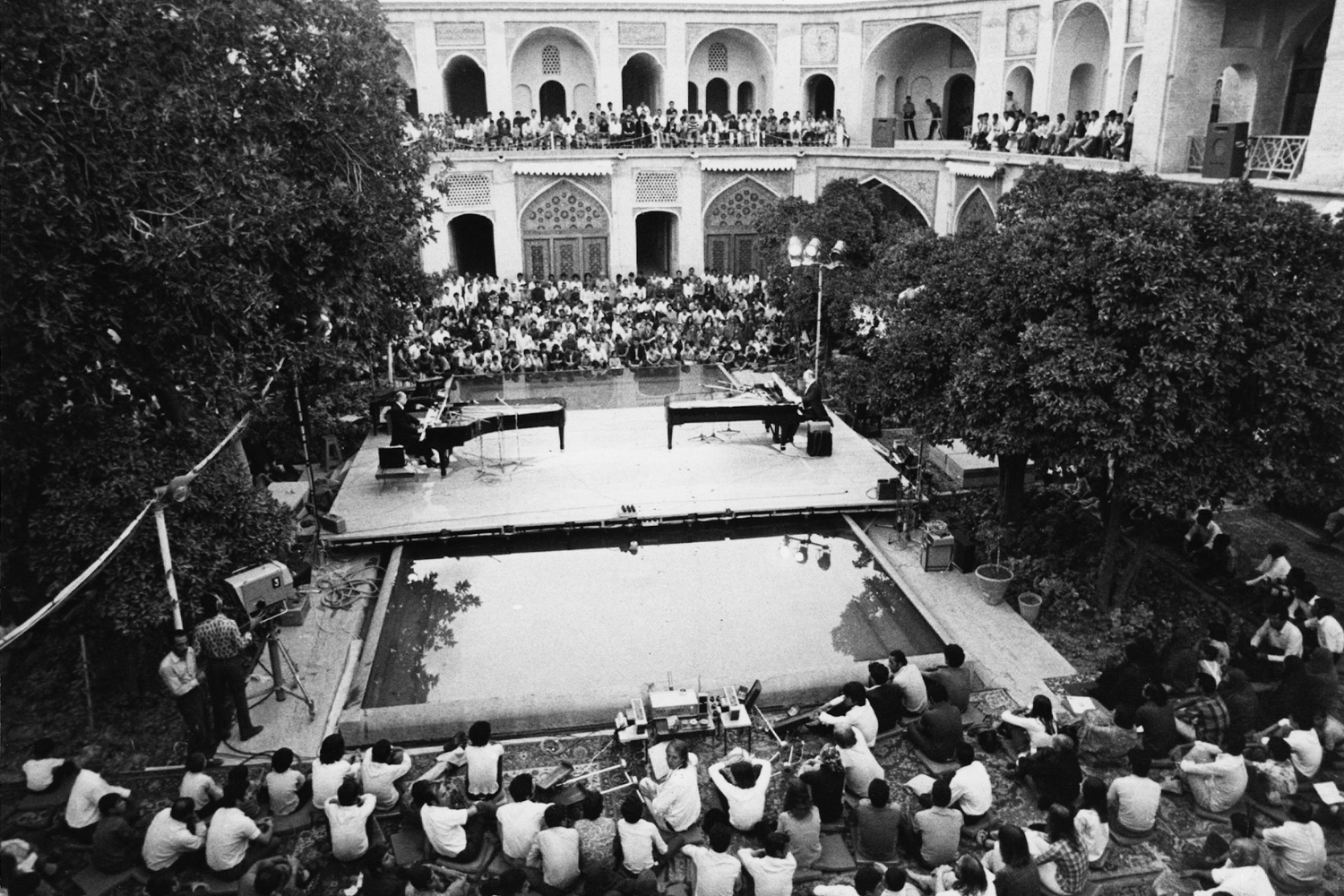A Utopian Stage

PROGRAM
A Utopian Stage
WHEN
February 9 – March 30, 2024
CURATOR
Vali Mahlouji
Bowerbird and Asian Arts Initiative are excited to present A Utopian Stage, a multifaceted project curated by Vali Mahlouji that unearths the vibrant history and the unique stage of the little known Festival of Arts, Shiraz-Persepolis, an international performance festival held annually in Iran from 1967 to 1977. The Festival's monumental scale and curatorial ambition created an unparalleled nexus of cultural exchange, but after the 1979 rise of the Islamic regime in Iran, the Festival was banned and many of its archives were destroyed. In the absence of this documentation, the Festival was for the most part forgotten, until Mahlouji (founder of the curatorial platform "Archaeology of the Final Decade") set out to piece together the puzzle and reconstruct its history. This exhibition brings together more than ten years of research and draws attention to Iran’s proactive role in promoting intercultural dialogues in the 1960s and 1970s - an idea that resonates with the hope of many younger Iranian generations, including those who stand up to defend against their inhibited rights and freedoms in the contemporary moment.
A Utopian Stage investigates this radical space and the legacy of the Festival of Arts through three acts:
ACT I. SHIRAZ-PERSEPOLIS: THE EXCAVATED ARCHIVES - features the exhibition of rare archival materials from the Shiraz Festival of Arts, which remains banned in its country of origin, Iran. The exhibition includes photographs, audios, videos, annual catalogues, graphic arts, ephemera, and other rarely seen items.
ACT II. THE SHIFTING SANDS OF UTOPIAS: A CULTURAL ATLAS - investigates the broader historical context and how a fluid artistic, philosophical and political exchange emerged across geographies, histories, and forms on an unprecedented scale. The Atlas examines those from the perspective of the concept "Global South".
ACT III. A UTOPIAN STAGE: INVOCATIONS - A series of performances by living artists that evoke the ethos of the Shiraz Festival of Arts, and A Utopian Stage forms a panoramic exchange of transcultural artistic discourse.
Image: Mantra, for two Pianos, Karlheinz Stockhausen (composer), Alfons Kontarsky, Aloys Kontarsky (pianists) – Saray-e Moshir, 1972; Courtesy Stockhausen-Stiftung für Musik / Archaeology of the Final Decade Archives
ABOUT THE SHIRAZ ARTS FESTIVAL
The Festival of Arts, Shiraz-Persepolis (also known as the Shiraz Arts Festival and the Shiraz Festival of the Arts) took place over eleven editions from 1967 to 1977. Accompanied by symposia and debates, the festival program included music, dance, drama, poetry and film, performed in a variety of venues in central Iranian city of Shiraz and surrounding areas, including the ancient ruins of Persepolis (ceremonial capital of ancient Persia, c.6th Century BCE), Naqsh-e Rostam, Hafezieh, Bagh-e Delgosha, Narenjestan, Bazaar-e Vakil, Jahan-Nama Garden, Saray-e Moshir and a concert hall on the Shiraz University campus.
Artists featured included Iannis Xenakis, Karlheinz Stockhausen, Ravi Shankar, Bismillah Khan, Morton Feldman, National Ballet of Senegal, Merce Cunningham Dance Company, John Cage, David Tudor, Max Roach, Abbey Lincoln, Yehudi Menuhin, Martha Argerich, Robert Serumaga, Duro Ladipo pido, Sardono Kusumo, Peter Brook, Peter Schumann and Bread & Puppet Theater, Robert Wilson, and Iranian classical singers Mohammad-Reza Shajarian and Parisa, among many others.
Focused on both traditional and avant-garde arts, the festival brought internationally acclaimed artists from across the world. The festival also sought out and showcased gifted Iranian artists old and young who relished sharing the stage with fellow Asian, African, North and South American and European artists from India, Japan, Indonesia, Vietnam, Uganda, Senegal, Nigeria, Egypt, Tunisia, Brazil, Argentina, Poland, France, USA, Hungary and many more. The intentional transcultural mixture, and juxtaposition of traditional and experimental, created a platform for an effervescent and unique multilateral exchange of creativity and inspiration.
The festival's progressive and utopian aspirations, and its founding and patronage by Shahbanu Farah Pahlavi (Queen of Iran, and wife of Shah Mohammad Reza Pahlavi, attracted controversies throughout its tenure, and eventually, a religious fatwa was declared by Ayatollah Khomeini against the festival in 1977. Its twelfth edition was canceled due to security reasons in the face of political unrest in 1978. With the establishment of the Islamist regime in Iran, the festival was banned in 1979, many of its Iranian directors and actors barred from work and its documents and archives destroyed.
CREDITS
Curator: Vali Mahlouji
Performance curators: Dustin Hurt and Vali Mahlouji
Exhibition Producer: Pete Angevine
Performance Producer: Andy Thierauf
With additional curatorial and facilities support from Asian Arts Initiative.
FUNDING CREDITS
Major support for A UTOPIAN STAGE has been provided by The Pew Center for Arts & Heritage, with additional support from the Musical Fund Society of Philadelphia.
